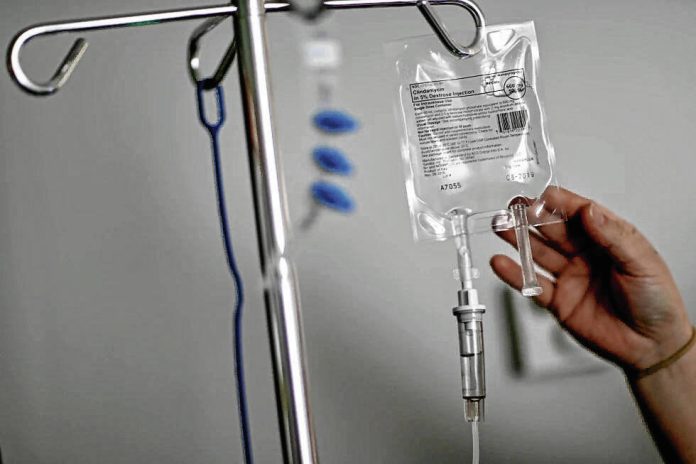One hospital serving Johnson County has begun to reschedule non-emergency procedures in the wake of an IV fluid shortage.
Franciscan Health Indianapolis has rescheduled a “small number of elective procedures,” but emergency care and urgent surgeries are unaffected, said Tony Veneziano, a hospital spokesperson.
Overall, the Franciscan hospital system’s supply chain team is working with vendors while leadership and the medical team are taking extra steps to ensure IV fluids are available for patients in need and evaluating other therapies for patients who may benefit from non-IV treatments, Veneziano said.
Johnson Memorial Health and Community Hospital South haven’t had to reschedule procedures yet, officials from the health systems said.
At Johnson Memorial, Dr. David Dunkle, the hospital’s president and CEO, said the hospital has not received the last two scheduled shipments of IV fluids due to the shortage.
For now, the hospital has an adequate supply but is taking steps to conserve IV fluids. Leadership is meeting multiple times per week to assess the situation on IV fluids, Dunkle said.
At Community South, the IV fluid supply is stable for now, with the hospital taking conservation measures and monitoring the situation closely, said Bobbie Brooks, a hospital spokesperson.
The shortage of IV fluids is a result of Hurricane Helene. Flooding caused by the hurricane’s inland rains that poured over the south has halted operations at Baxter International’s North Cove, North Carolina. The facility makes about 60% of the IV solutions used in the U.S. every day, according to the American Hospital Association.
The facility also makes fluids used by patients on home dialysis and sterile water used to clean patient surgery sites during operations.
Flooding triggered by the storm washed out bridges nearby and water came into the factory, forcing the shutdown. Baxter representatives say the site sustained no structural damage.
Health systems around the country started conserving fluids shortly after the plant shut down in late September. Some switched patients who can drink fluids to Gatorade or water instead of giving them an IV.
Hospitals also have started postponing planned procedures that can wait, like some orthopedic surgeries or heart procedures, Dr. Chris DeRienzo, chief physician executive for the American Hospital Association, told the Associated Press.
Baxter has limited the fluids supplies it sends to distributors and health systems. The impact on patients depends on how heavily a hospital or health system relies on Baxter, Nancy Foster, a vice president with the hospital association, told the Associated Press.
The U.S. Food and Drug Administration has approved temporarily importing fluids from Baxter plants in several countries. The company also has already started easing some of the limits it had placed on supplies.
Baxter says it wants to restart production in phases by the end of the year, and also expects to ease limits it has placed on some customer orders by then.
However, the company has no timeline for production to return to pre-hurricane levels.





